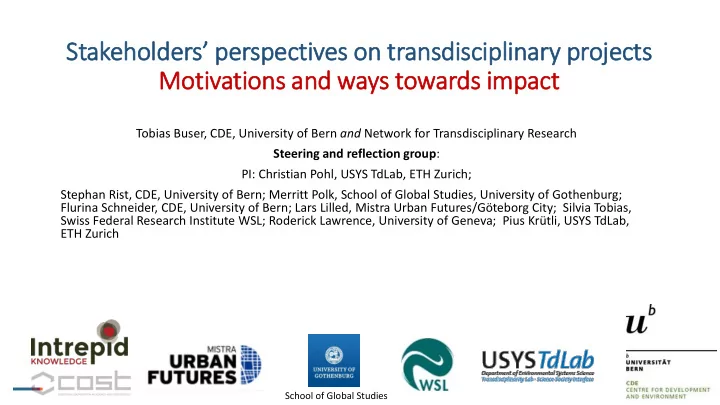

Stakeholders’ perspectives on transdisciplinary projects Motivations and ways towards im impact Tobias Buser, CDE, University of Bern and Network for Transdisciplinary Research Steering and reflection group : PI: Christian Pohl, USYS TdLab, ETH Zurich; Stephan Rist, CDE, University of Bern; Merritt Polk, School of Global Studies, University of Gothenburg; Flurina Schneider, CDE, University of Bern; Lars Lilled, Mistra Urban Futures/Göteborg City; Silvia Tobias, Swiss Federal Research Institute WSL; Roderick Lawrence, University of Geneva; Pius Krütli, USYS TdLab, ETH Zurich School of Global Studies
Project goals WP1: Identify and analyse stakeholders’ interests, values and goals to participate in transdisciplinary urban development projects WP2 : Identify and analyse participant’s ways of linking transdisciplinary projects to their organisation WP3: Jointly develop criteria for successful transdisciplinary urban development projects with representatives of the different stakeholder groups Tobias Buser COST INTREPID Final Meeting 27-03-2019
Project str tructure and methods • The study is based on consultations (interviews, meetings) and co- production events (workshops) with representatives of public organisations (administration on local and regional level, and politicians) and NGO’s engaged in research projects on sustainable urban and periurban development. Tobias Buser COST INTREPID Final Meeting 27-03-2019
Cases and In Interv rviewpartners Mistra Urban Futures, Gothenburg, Sweden: • 16 interviews, one workshop, and a short group consultation • 13 Representatives from 3 MUF projects, WISE, KAIROS and Urban Station Communities (predominantly from public administration, all levels from city, GR, region and landstyrelsen, polititicians) • 2 Programme leaders and 1 longterm programme consultant, both academic and practitioners RAMUN (Room for people and nature), 4 case study regions, Switzerland • 10 interviews (public administration, local politicians, NGOs) • + material available from evaluations we already conducted earlier Tobias Buser COST INTREPID Final Meeting 27-03-2019
Observ rvations regarding th the sample • The interviewees have participated in at least one transdisciplinary project and were willing to reflect their experiences in an interview and/or workshop • a high number of «boundary persons» among the interviewees • Strong interest in scientific and other types of knowledge • Dedication to democratic and justice values • Strong interest in reflection and some joy to deal with various perspectives Tobias Buser COST INTREPID Final Meeting 27-03-2019
Stakeholders’ motivations to part rticipate • Topic: important, often strategic questions that are relevant for the own tasks/organisation • Tackling challenges/developments with higher complexity than usual tasks of the respective organisation • Getting to know other perspectives / reflecting own perspective with others • Co-production ways seen as value in itself - the right way to go in a democracy • Connecting with other actors in the field • Input from science to reflect own strategies Tobias Buser COST INTREPID Final Meeting 27-03-2019
Stakeholder’s expectations • Being engaged in a process that is not only talking about co- production, but really is “walking the talk” • Being respected as an expert in their domain • Getting access to state of the art knowledges • Results that are useful/concrete / (mostly when aiming at a concrete product/strategy (e.g. climate strategy of the city), but also broaden the horizon • Being part from the beginning / framing of the project • Flexibility of scientists, inclination towards real world challenges Tobias Buser COST INTREPID Final Meeting 27-03-2019
How do stakeholders li link k back k to their ir in instit itutional l context xt? Tobias Buser COST INTREPID Final Meeting 27-03-2019
How do stakehold lders li link back to th their ir ins instit itutio ional l context xt? (I) (I) Informing • Delivering information and reflection on the projects in the organisation’s own publications Enabling Consultation • Forming inter-departmental working groups to discuss ongoing projects and their implications Enabling Co-production • Encouraging employees/ colleagues to participate in co-production projects including reallocation of resources • Starting collaborations with other participants Tobias Buser COST INTREPID Final Meeting 27-03-2019
How do stakehold lders li link back to th their ir ins instit itutio ional l context xt? (II) (II) Institutional learning, Capacity building • Using participatory and co-production methods in other projects • Restructuring planning processes in more participatory ways, integrating and deliberating more knowledge perspectives Policies and products • Policies and strategies (e.g. climate strategy for Gothenburg) are an output of the process Re-using process designs • Using process designs, e.g. to develop strategical policies as adaptable templates for similar strategy developments Tobias Buser COST INTREPID Final Meeting 27-03-2019
Whic ich ele lements and forms of colla llaboration do s stakeholders gauge as specifically im important/critical/promising? • Interaction, deliberation and learning platforms with physical meetings • Inspiration and reflection through other perspectives, knowledge and experiences • Increasing the quality of the own work and the regions attractivity and development • Capacity development and motivation of employees in own organisation and in the region • Creating and facilitating «Arenas», on the one hand outside the usual political processes, but on the other hand linked to concrete challenges and projects Tobias Buser COST INTREPID Final Meeting 27-03-2019
• Creation of sound systems knowledge (based on broad range of perspectives) as basis for strategy development, enhances agency through more clarity about the state of the art and as perceived “neutral” decision base • Co-creation and deliberation on joint goals and differences in visioning processes, fosters agency through increased clarity on desirable and undesirable futures. • Creating actionable strategies and steps towards goals and visions, based on the best available knowledges. Enhances agency through addressing (and integrating) potential barriers/opponents early and through the plausibility to pursue “the best available options” • Experiencing successful co-production processes, leads to enhanced agency through transformation knowledge on participative approaches and methods Tobias Buser COST INTREPID Final Meeting 27-03-2019
Thank you for your attention! QUESTIONS? Tobias Buser COST INTREPID Final Meeting 27-03-2019
Recommend
More recommend